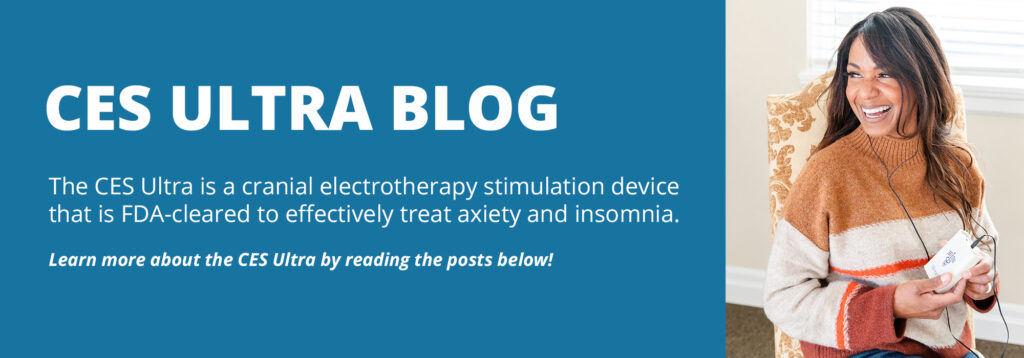Why Should I Use a CES Device? You may be wondering what aspects of your life cranial electrotherapy stimulation may improve. While the name sounds intimidating, CES is a pain-free, gentle treatment that can be used by anyone for a variety of problems, or simply for maintaining some important functions of the brain and body.
What is CES?
CES is an FDA-approved, drug-free treatment device that delivers microcurrents at a specific frequency. When applied to certain areas of the body, these microcurrents stimulate the hypothalamus in the brain, which controls an array of important regulatory functions. When in an electrically unbalanced state, the brain’s ability to regulate digestion, temperature, circadian rhythm and sleep cycles, emotions, and production of neurotransmitters is interrupted. CES works to correct imbalances and strengthen hypothalamic brain function.

While CES studies have shown emotional and physical improvements in regular individuals, it can also be especially effective when targeting specific ailments.
To name a few, significant improvement has been reported in those suffering:
- Insomnia
- Anxiety disorders
- Depression
- Headaches
- Chronic pain
- Drug and alcohol use disorders
So, why use CES rather than other common medical treatment or supplementation?
There are many reasons to consider CES treatment over, or in conjunction with, other medical treatments such as;
Convenience
CES is a pocket-size device that can be worn and used in 30-45 minute intervals during every-day tasks such as working, cooking, watching tv, gaming, resting, etc. There are few instances where CES should not be worn, such as while driving or during sleep. For convenient, low-maintenance treatment, simply clip CES to a waistband, apply the ear-clips or gel pads, and let the microcurrents work while you go about your day!
Drug-free, non-habit forming, and without harmful side-effects
While medications for anxiety and depression can be helpful for relieving symptoms, they often don’t tackle the underlying imbalance causing those symptoms. Many prescription mood drugs carry a risk of negative, lasting side effects and potential addiction.
There is no “one size fits all” medication for emotional disorders, and it can be an ordeal finding a drug that works for a specific individual’s needs.
SSRIs, or selective serotonin reuptake inhibitors, treat anxiety, depression, and other emotional disorders. They inhibit the reuptake of serotonin produced in the body, so that the function of the present serotonin is stretched to its fullest potential. However, over time, this may cause “down regulation” of serotonin receptors, which means they’ll enter a hypoactive state if the drug is discontinued. This can cause a complete halt in serotonin production, which deregulates many important functions in the brain and body.
Low Serotonin? Or Something Else?
Some new evidence suggests that SSRIs may not be as effective at treating depression as previously thought. In fact, there’s never been evidence in the first place that serotonin activity is related to depression at all. However, serotonin IS an important messenger that facilitates communication between nerve cells in the body. When an SSRI interferes with this function, it may induce negative effects on multiple body processes, especially if you discontinue the drug after a period of use.
For sufferers of anxiety or combined anxiety and depression, research shows that an increased level of serotonin may actually contribute to anxiety, rather than lessen it. Anxiety is actually a common side effect of taking SSRIs. One would think it seems counterproductive to prescribe anxiety-inducing pharmaceuticals to treat anxiety disorders. Because anxiety is a symptom rather than a disease in itself, other drug-based treatments can be complicated. Taking benzodiazepines or sedatives may offer short-term relief from anxiety, but using these for a long period of time may run a risk of both addiction and negative side-effects. Other drugs used in anxiety treatment target other symptoms of anxiety such as nerve pain, depression, and insomnia.
When it comes to treating and eliminating anxiety, the most effective and long-term options are those that correct the underlying issues causing anxiety as a symptom.
Rather than altering the function of brain chemistry through drugs, CES re-balances the brain in a way that it may return to optimal chemical production naturally. Discontinuing use or skipping a “dose” won’t cause withdrawal symptoms or entirely halt receptor activity. CES will not cause a dependency on treatment or negatively alter the way that the body produces and reabsorbs neurotransmitters.
Effectiveness of combining mental health therapies and CES device treatment
When addressing specific mental health ailments, there’s often both mental and physical factors contributing to symptoms. When the brain and nervous system aren’t working to their fullest potential, it can make it more challenging to heal trauma and rewire neural pathways through psychotherapy. By balancing hypothalamic activity, CES can increase the effectiveness of mental health counseling and talk therapies.
Sleep improvement and circadian rhythm regulation
Even without a specific ailment, anyone can improve their sleep and circadian rhythm with CES. A number of processes affected by a variety of different factors facilitate sleep, such as; the amount and type of light you’re exposed to and at what times of day, the foods you eat, activity level and exercise, and internal chemical functions which both cause the body to become sleepy, and guide it through its sleep cycles.
You may have heard of your “internal body clock,” or circadian rhythm. This is the regulation of neurotransmitters and hormones released throughout the day which let your body know when to sleep and wake. Since neurochemicals (which are influence by a number of outside stimuli and cues), guide the circadian rhythm, an unbalanced circadian rhythm is often the cause of insomnia and poor sleep.

Melatonin and Your Internal Body Clock
When someone develops a bout of insomnia or poor sleep, they may opt to supplement with melatonin. However, many people tend to misunderstand the function of melatonin. Melatonin acts as the driving hormone of the circadian rhythm. Today, we are constantly exposed to overstimulation. Blue-light-emitting screens, quick dopamine rewards, and other factors deregulate physiological and nervous system functions. Because of this, unbalanced circadian rhythm has become a common issue. When the pineal gland releases melatonin at the wrong time, or not at all, this stimulates the release of all the wrong chemicals at the wrong times. This can contribute both to sleep and mood problems.
To remedy this, many take a melatonin supplement prior to bedtime as if it were a “sleep pill.” The problem is, when taken in the wrong dose or at the wrong time, melatonin supplements may not contribute to easier sleep. Further, when taken every night, it’s possible to build a dependance on the supplement. This prevents the brain from being able to make its own. Melatonin supplements can be useful for correcting jet-lag or resetting a circadian rhythm, but only when used correctly and taken short-term.
If the brain isn’t making melatonin and other sleep-hormones when it needs to, using a CES device can help reset the body clock. When used for 30-45 minutes about an hour before bed, easier and more restful sleep may be seen within days.
Affordability
Maybe you’re sold on every aspect of CES treatment, until you see the one-time price. While it may seem like a lot of money to shell out, let’s look at average costs for alternative treatments.
Psychotherapy
On average, a session of therapy costs $90. Most people in therapy attend a weekly session, which adds up to $360 per month. Therefore, the average cost of therapy per year is around $4,320. A one-time purchase of a CES Ultra device costs about the same as one month of therapy, but it lasts for years to come.
Pharmaceuticals
The cost of medication for mental health disorders can vary greatly, depending on a number of factors. There are generic and brand-name options, and some people can only take a specific drug or brand.
Generic anti-depressants average out to $62.50 for a month’s supply. The cost of brand-name meds is significantly higher, averaging out to $487.75 for just one month.
Anxiety medication runs at an even steeper cost, averaging $67.04 for generic brands and $1,038.97 for brand-names.
CES Ultra Compared to Other CES Devices
CES Ultra is a high-quality CES device that’s designed for convenience, ease, and durability. The microcurrent output is controlled with a dial, rather than “up” and “down” buttons found on other devices. This way, you can customize the output exactly to your comfort level. The lack of a screen makes CES Ultra immune to cracks and shatters, unlike other devices.
On top of these features, CES Ultra is more affordable than other CES devices, which cost significantly more. If you’re going to invest in CES treatment, go for the customizable, less breakable option!
HSA Eligible
On top of costing significantly less than alternative treatments, CES is also eligible for HSA reimbursement.
It is Possible to Get Better
It’s a tough battle living with an invisible health or mental health issue. Common Western treatments for depression, anxiety, and insomnia vary from person to person, often carry negative and long-lasting side-effects, and may not even correct the underlying issue causing symptoms. If you’re experiencing any of the aforementioned ailments, consider seeing a practitioner about CES treatment.
It is possible to get better!
**This article is written for informational purposes only, and does not constitute medical advice. Always work with a qualified healthcare provider when making decisions about your health and wellness.
Sources
https://www.talktomira.com/post/how-much-does-anxiety-medication-cost-without-insurance

